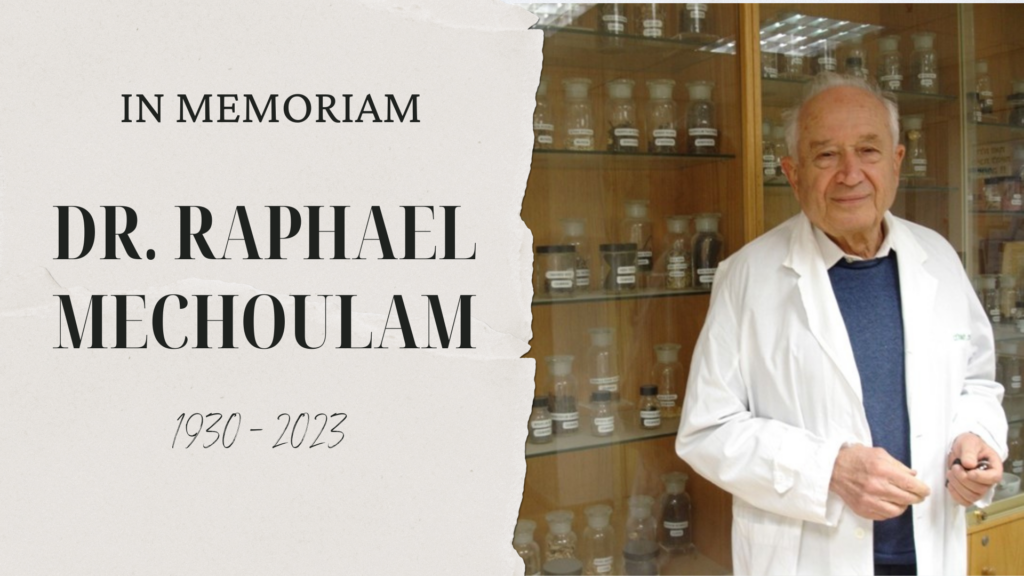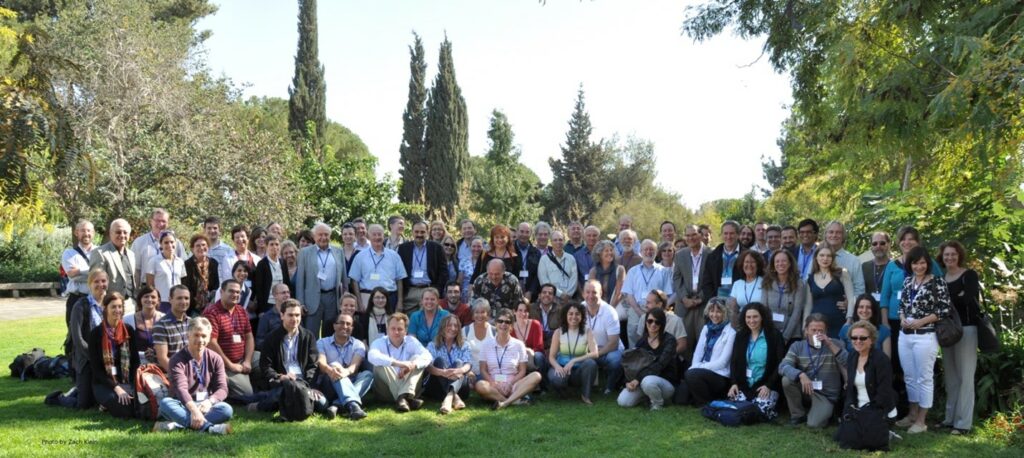
written by founding CCIC members, Dr. Mary Lynch and Dr. Linda Parker
Dr. Raphael Mechoulam widely known as the “Father of Cannabinoid Research” was the preeminent leader in his field and a widely sought speaker when he kindly agreed to come to Halifax, Nova Scotia in the year 2000 to help us (Mary Lynch) launch the Canadian Consortium for the Investigation of Cannabinoids. He had identified CBD and THC and synthesized THC, discovered the endocannabinoids and was leading a highly productive lab located on the Ein Karem campus of Hebrew University. He had been awarded the Israel Prize in Exact Sciences for Chemistry and was poised to go on to win numerous prestigious awards and honorary degrees, including at our own University of Guelph. I had the distinct pleasure of visiting Raphi at his office on numerous occasions and remember it was always busy with students and associates. I clearly remember his office stacked from floor to ceiling with books, one shelf in particular with huge ring binders titled “patents“ with the numbers of the many compounds he had invented. I remember on one occasion a man arrived and waited very quietly in the entrance until Raphi spotted him. Raphi introduced us and provided the gentle man with a couple of small tubes of a substance while the man told me about his wife who was suffering with cancer and explained that when she took a few small drops she was able to eat and was not in so much pain.

and held on the beautiful campus of Hebrew University at Givat Ram, Jerusalem
Raphi was dedicated to helping people; the foundation of his research was ultimately to apply the research findings to relieve suffering and promote health. He was a prodigious researcher, collaborator and mentor. The tribute on the ICRS website states “Raphi’s work paved the way for so much of the research of our Society’s Members and formed the cornerstone of knowledge leading to seminal discoveries on the endocannabinoid system. It cannot be overstated his significance in the many decades since his early discoveries.” Raphi and his beloved wife Dahlia were also dear friends to many of us. Together they traveled the world and made many trips to Canada to meet with collaborators and friends here. They welcomed many into their home in Jerusalem for warm Israeli hospitality. Dahlia is an excellent cook and it was a true blessing to sit at their table while Raphi would regale us with stories of science and humor. At the ICRS meeting in Hungary, my then 15 year old youngest daughter, who had joined the after dinner conversation nightly asked, “Mummy, when Raphi talks, how come everyone else goes quiet?” My response, “Because everyone wants to hear what Raphi has to say.”

Raphi brought me (Linda Parker) into the cannabinoid world in 2000, with the arrival of an airmail envelope from Israel in my faculty mailbox at Wilfrid Laurier University. In late 1999, Cheryl Limebeer and I published a paper showing that THC reduced nausea in a rat model that we had a role in developing. To my astonishment, the finding caught Raphi’s attention! In his humble style, Raphi introduced himself in the letter by saying, “I, too, am a cannabinoid researcher.” Of course, I was so excited-dancing around the halls! His letter suggested that we begin a collaboration testing other cannabinoids using this model. We began with CBD. For nearly a quarter of a century my students and I have enjoyed a wonderful, fruitful collaboration and warm friendship with the most generous and accomplished scientist that I have had the pleasure of knowing. Raphi invited me to attend my first ICRS meeting in Monteray (2002) where we finally met in person. ICRS provided a forum for me and my students to meet with several cannabinoid researchers who would also be so important in our programs of research over the years.
Our most recent work with Raphi (and collaborators Vincenzo DiMarzo and Aron Lichtman) has been the investigation of potential anti-addictive properties of the newly discovered fatty acid amides, Oleoyl Glycine and Oleoyl Alanine. Oleoyl Glycine was released in addiction-related regions of the brain and when exogenously administered reduced addiction-related behaviors in animal models. Raphi was so very excited about this work! As well, in 2022, Raphi, Erin Rock and I published a book with MIT Press entitled, “CBD: What does the science say?” It was such a delight working through the various chapters with Raphi during this project. He told me that it was fitting that he end his career with such a project, since he began his cannabinoid career with the identification of the structure of the CBD molecule (Mechoulam and Shvo, 1963).
For all of his lifetime accomplishments, Raphi was awarded the Harvey Prize in 2019 for “his groundbreaking research elucidating the components, mechanisms of action, and implications for human health of the endocannabinoid system”. The Harvey Prize is often the precursor to the Nobel Prize (Eric Kandel, Jennifer Doudna & Emmanuelle Charpentier).
Raphi was so proud of his children (Roy, Dafna and Hadas) and his seven grandchildren. His wife Dahlia was always by his side.
